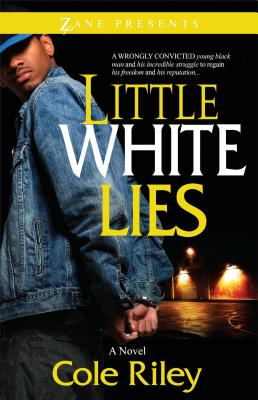Book Review: Little White Lies (Zane Presents)
by Cole Riley
Publication Date: Nov 26, 2013
List Price: $15.00
Format: Paperback, 272 pages
Classification: Fiction
ISBN13: 9781593095185
Imprint: Strebor Books
Publisher: Simon & Schuster, Inc.
Parent Company: KKR & Co. Inc.
Read a Description of Little White Lies (Zane Presents)
Book Reviewed by Michelle Paynter
Little White Lies is more than a pathetically sad and heartbreaking story of Melvin, a young, aspiring Black high school athlete, who wrongfully faces rape charges involving two white girls. It has a realistic feel of a tale ripped from the headlines. Written honestly and compellingly as not only a cautionary tale for young black men in a generation, it offers a bleak picture of a fragmented family with parents who speak of loving both their sons, yet they blink at their older son’s decent into chronic mental illness and addiction.
As a person trained in clinical social work and experienced in conducting therapy with poor and dysfunctional families, I recognize these people in this book: a father who shows his elder son favoritism and withholds love, acceptance and paternal guidance from the younger one. Or a mother who loves her sons but remains silent in her world of emotional abuse and her own personal demons. A broken family, who is overwhelmed by emotional violence and verbal abuse, remain ignorant of their sons are sinking deeper and deeper into an abyss of darkness.
In an age where Black boys and young men are demonized, Cole Riley’s scathing book reveals an authentic observation of what the state of affairs is for many Black youth in urban communities across our nation. Much like the book’s main character, Melvin, many of our Black male youth are lost and confused in finding their purpose in life. Our Black male youth, in particular, are rendered vulnerable to the sexual stereotypes that the dominant culture continues to perpetuate. They neither know the proud history of our African ancestors, nor are they are aware of the dreaded sexual taboo of race and rape. Everybody knows that when a Black man is accused of sexually assaulting a woman, prosecutors are more inclined to pursue greater sentences if the victim be a white woman than if the victim is Black.
Graphically realistic, Melvin’s arrest and prosecution is rendered honestly, like so many Black youth experience daily in our cities. Riley gets it right: “I didn’t do nothing,” I pleaded. One detective had his knee on my back while the other handcuffed me. Some of the crowd protested their harsh treatment of a young kid. Two of the brothers tried to push the officers away from me. The detective, who cuffed me, pulled a gun and was waving it around. (pg. 108)
Although Melvin was legally vindicated of the rape at the conclusion of the book, he is shown no mercy as the society, his family and friends find him “guilty” in their social and emotional abandonment of him. One of the particularly gripping scenes in the book is when Melvin’s mother visits him at the jail: She reached across the table and grabbed my elbow, pinching it harshly. “Melvin, I’ve been afraid for both of you boys,” she said with a rasp in her voice that was never there before. “I didn’t want you to get shot, get in trouble with the law, or get put behind bars. Now, you’re a statistic, one of those damned failures in the neighborhood. I hate this, Melvin, I just hate it.” (pg. 138)
Outrageous, raw, and unnerving, Riley’s novel should encourage each of us to consider our role in loving our Black youth unconditionally, holding them closer to our hearts more than ever, as we impart some painful truths about this life. Remember: any of our youth could suffer the same fate as Melvin. This is a great achievement. Everyone should read it.

